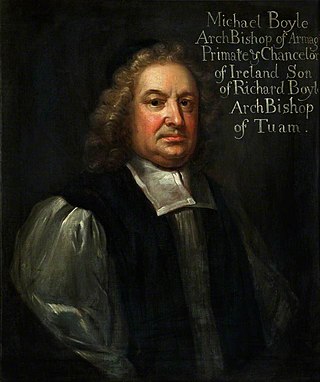Vice-Chancellors and Pro-Chancellors of the University of Dublin
The Chancellor of the University of Dublin is supported by a number of Pro-Chancellors who may act in his/her place. The appointment was formerly known as the Vice-Chancellor; this post was held by one individual who acted as deputy to the Chancellor. In 1964, the Vice-Chancellor was replaced by a group of Pro-Chancellors (up to a maximum of six): the seniority of the Pro-Chancellors is determined by date of election. [4] [5]
Vice-Chancellors
- 1: Henry Alvey (1609–1612) (had been Provost, 1601–1609)
- 2: The Revd Luke Challoner (1612–1613) (had been Regius Professor of Divinity)
- 3: Charles Dunn/Doyne/Ó Duinn JCD (1614–1615) "distinguished legist ... son of the Chief of Hy Regan" [6] MP for Dublin University, 1613 [7]
- 4: The Most Revd James Ussher (1615–1646), Archbishop of Armagh, 1625-1656
- 5: The Right Revd Henry Jones (1646–1660), Bishop of Clogher
- 6: The Right Revd Jeremy Taylor (1660–1667), Bishop of Down and Connor
- 7: The Most Revd James Margetson (1667–1678), Archbishop of Armagh
- 8: The Right Revd Michael Ward (1678–1681), Bishop of Ossory (1678-1680), Bishop of Derry, (1680-1681)
- 9: The Most Revd Anthony Dopping (1682–1697), Bishop of Meath
- 10: The Very Revd Edward Smith or Smyth (1697–1698), Dean of St Patrick's Cathedral, Dublin
- 11: The Most Revd Richard Tenison (1698–1702), Bishop of Meath
- 12: The Right Revd St George Ashe (1702–1713), Bishop of Clogher
- 13: The Most Revd John Vesey (1713–1714), Archbishop of Tuam
- 14: The Right Revd Thomas Smyth (1714–1721), Bishop of Limerick
- 15: The Right Revd John Sterne (1721–1743), Bishop of Clogher
- 19. Richard Robinson, 1st Baron Rokeby (1765-1791), Archbishop of Armagh
- 20. John FitzGibbon, 1st Earl of Clare (1791-1802), Lord Chancellor of Ireland, (1791-1802)
- 21. Arthur Wolfe, 1st Viscount Kilwarden (1802-1803), Lord Chief Justice of the King's Bench in Ireland (1798-1803)
- 22. John Freeman-Mitford, 1st Baron Redesdale (1803-1806), Lord Chancellor of Ireland, (1802-1806)
- 23. William Downes (1806-1816), Lord Chief Justice of the King's Bench in Ireland, (1803–1822)
- 24. Thomas Manners-Sutton, 1st Baron Manners (1816-1829), Lord Chancellor of Ireland, (1807-1827)
- 25. The Most Revd Lord John George De La Poer Beresford (1829-1851), Archbishop of Armagh
- 26. Francis Blackburne (1852-1867), Lord Chancellor of Ireland, (1852 and 1866–67)
- 27. Sir Joseph Napier (1867-1880), MP for Dublin University, (1848–1858), Lord Chancellor of Ireland, (1858-1859)
- 28. John Thomas Ball (1880-1895), MP for Dublin University, (1868–1875), Lord Chancellor of Ireland, (1875-1880)
- 29. Dodgson Hamilton Madden (1895-1919), MP for Dublin University, (1887-1892)
- 30: John Henry Bernard (1919-1919), Archbishop of Dublin (1915-1919), Provost (1919-1927)
- 31: Sir James Henry Mussen Campbell, first Lord Glenavy (1919-1931), Lord Chancellor of Ireland, (1918-1921)
- 32: Sir Thomas Francis Molony (1931-1949), Lord Chief Justice of Ireland, (1918-1924)
- 33: Michael Parsons, 6th Earl of Rosse (1949–1979); Vice-Chancellor to 1964
Pro-Chancellors
- 33: Michael Parsons, 6th Earl of Rosse (1949–1979); Pro-Chancellor from 1964
- 34: Bryan Guinness, 2nd Baron Moyne (1965–1977)
- 35: Professor George Alexander Duncan (1965–1972)
- 45: Anthony Joseph Francis O’Reilly (1994–2011)
- 46: Susan Jane Gageby Denham (1995–2010)
- 47: Professor Eda Sagarra (1999–2008)
- 48: Patrick James Anthony Molloy (2000–2013)
- 49: Professor Dermot F. McAleese (2005–2017)
- 50: Professor Vincent John Scattergood (2008–2015)
- 51: Professor Thomas David Spearman (2009–2012)
- 52: Petros Serghiou Florides (2010–2012)
- 53: Mary Henry (2012–2015)
- 54: Edward McParland (2013–2018)
- 55: Dame Jocelyn Bell Burnell (2013–2018)
- 58: Professor David McConnell (2016–2019)
- 59: Dr Sean Barrett (2018–2019)
- 60: Professor Sheila Greene (2018–2022)
Current
- 56: The Honorable Sir Donnell Deeny (2014–present)
- 57: Professor Jane Grimson (2016–present)
- 61: Dr Stanley Swee Han Quek (2019–present)
- 62: Professor Shane Ann Patricia Allwright (2020–present)
- 63: Professor Ignatius Thomas McGovern (2020–present)
- 64: The Honourable Frank Clarke (2022–present)










